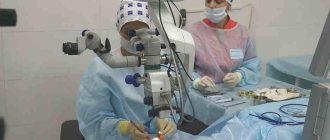Can LASIK be done during pregnancy?
Pregnancy and lactation are temporary contraindications to LASIK. There are corresponding reasons for this. Firstly, at this time the female body produces more hormones, which can slow down post-operative recovery. Also, other changes can cause tissue softening and cell growth, which sometimes leads to elongation of the cornea. Secondly, after this procedure the patient needs to instill antibiotic drops. They can enter the fetus's body through breast milk or the placenta and harm its health.
Is it possible to do laser coagulation of the retina during pregnancy?
Laser coagulation of the retina is a minimally invasive procedure that is not capable of harming the health of the expectant mother and fetus. The manipulation has no contraindications except for severe heart defects and renal failure.
It is indicated for all pregnant women from the 12th week of pregnancy. Natural childbirth after laser coagulation is allowed. A woman has a greater chance of giving birth to a child herself, without resorting to a caesarean section.
It is advisable to carry out the procedure before the 30th week of pregnancy. Since after this period the risk of developing premature labor increases.
It is necessary that the pregnant woman has time to undergo the rehabilitation process and fully recover before delivery, otherwise there is a high risk of recurrent retinal rupture or retinal detachment with more serious complications.
Planning a pregnancy after LASIK
A few years ago, doctors did not recommend giving birth naturally after such an operation, but recommended a cesarean section. Nowadays, women give birth on their own after vision correction.
The fact of the procedure itself has ceased to be decisive in this matter; only the condition of the retina is important. If it peels off or there are ruptures and hemorrhages, then vision may deteriorate after the birth of the child. This occurs as a result of the heavy load on the body during childbirth. Therefore, those pregnant women who have had LASIK surgery should definitely have their eyes checked by an ophthalmologist. If the doctor detects retinal detachment, the woman will undergo a special procedure called laser coagulation.
Top 5 “don’ts” of laser correction: from boxing to eyelash extensions
Laser correction restores vision, but what if it takes something away? Is it possible to give birth after laser vision correction? Or play sports? There are a lot of scares floating around the Internet like “after surgery you can’t play sports”, “after surgery you can only give birth through cesarean section” and the like. Like any fiction, they are based on facts. But these facts are so distorted that they are of no use. In this article, we’ll look at what you really can’t do after laser vision correction.
Let’s say right away: there will be restrictions after the operation. But not forever. The prohibitions apply only to the rehabilitation period, which lasts approximately six months. At the same time, no one forces you to give up your favorite activities or plans for six months - you can return to many earlier. And when the rehabilitation takes place, the restrictions will be lifted. After laser vision correction, the ophthalmologist at our clinic will decide when you can return to normal life.
Sport
A complete ban on sports after laser correction applies only to the first few days. Then you can return to active life in stages. You can do exercises and run after vision correction within a week. More serious sports will have to wait for two reasons:
Exercise and light fitness are allowed within a few days after laser correction. Heavy sports activities will have to be postponed.
- Load on the body. Intense exercise can cause intraocular pressure to increase, which is harmful for weakened eyes. Therefore, you can return to weightlifting only a month after the operation.
- Eye injuries. If you love football, martial arts and boxing, laser vision correction will take you away from your activities for about two months. In contact sports, there is a high risk of damaging the eyes and displacing the top layer of the cornea, which was cut during surgery. Therefore, until everything heals, I won’t step foot in contact sports.
But swimming and vision correction go together in an interesting way. You can return to swimming in a month, because it will help restore your eyes. When the shoulder girdle warms up, the brain is saturated with blood and oxygen. Therefore, swimming will help during rehabilitation.
Rehabilitation periods for different sports are described in detail in this article.
Pregnancy and childbirth
It is recommended to plan a pregnancy six months after vision correction - your doctor will tell you the exact timing. There is no need to be afraid that you will be forced to give birth through cesarean section - usually there are no such restrictions after vision correction.
Childbirth immediately after surgery is not recommended for two reasons:
- Pregnancy is a burden. As in sports, it is better to endure a rehabilitation period. Childbirth after laser vision correction can lead to the same results as sports activities.
- Dry eyes are one of the body's reactions to pregnancy, associated with hormonal changes. Getting pregnant immediately after vision correction means putting your eyes through an additional test. Dry eye syndrome develops in many patients after surgery. It usually goes away quickly, but if your eyes are already dry, the rehabilitation process may take longer.
Nothing will prevent you from giving birth after laser vision correction, when the rehabilitation period is over.
Cosmetics
You cannot use mascara, eye shadow or eyeliner for a month from the date of surgery. The smallest particles of cosmetics can cause irritation and even inflammation if they get on the cornea that has not yet healed.
Lamination of eyelashes after vision correction is not recommended. But if laser vision correction is coming soon, girls can solve the problem by doing lamination in advance. Then you will have a beautiful look, and you can do without mascara.
Although you can already do makeup after a month, eyelash extensions after vision correction are allowed only after two months.
We described the stages of returning to using cosmetics after laser correction in this article.
Alcohol
You will have to give up strong drinks a couple of days before the procedure and wait at least two more weeks after the operation. There are several reasons for the limitation:
Before laser correction and during the rehabilitation period, drinking alcohol is prohibited!
- Medicines. After the operation, you need to instill special drops - antibiotics incompatible with alcohol.
- Dehydration. Alcohol is a diuretic, causing the body to lose a lot of water. All mucous membranes suffer from this, including the surface of the eye. After laser correction, you should not allow your eyes to dry out.
- Risk of injury. For the first time after surgery, it is strictly forbidden to touch your eyes, and after several glasses of alcohol there is a risk of losing coordination or forgetting that you should not touch your face.
Only a doctor can tell when a patient should return to drinking alcohol.
Gadgets, books and hobbies
Finally, we left a short but uncomfortable restriction - giving up gadgets, reading, knitting and other favorite entertainment. You will only have to do without them for a few days.
It is better not to pick up a phone or tablet for a day after surgery - your eyes will get tired quickly. After laser correction, patients experience eye dryness, which increases after several minutes spent in front of a bright monitor. Reading and other activities that require eye strain will also cause discomfort.
Books and films can be replaced: download audiobooks, ask your family to read aloud, play songs that you haven’t listened to for a long time.
No one can take away your plans, habits, physical activity and the rest after vision correction. All restrictions are individual and often depend on the correction method.
When the rehabilitation period is over, you will be able to enjoy life and sharp vision.
What needs to be done to ensure that childbirth after LASIK is safe for the eyes?
To protect your eyes from possible complications, several conditions must be observed after surgery:
- do not plan a pregnancy for 3–4 months after correction (some doctors advise waiting six months);
- be examined by an ophthalmologist for retinal detachment;
- regularly visit an ophthalmologist.
Thus, the operation itself is not associated with risks during and after childbirth. It all depends on the specific case and what the doctor says.
There is another question that often worries women: is laser correction contraindicated for nulliparous women? The answer to this question is the same: if there are no contraindications or restrictions from the doctor based on the examination results, then it can be done.
MagazinLinz.ru team
Is it possible to have laser vision correction before giving birth?
July 2, 2015
In not so long ago, there was a widespread belief that eye surgery could only be performed on women who had already given birth. This opinion, to some extent, is still widespread, but in fact it is not true.
“We also perform laser procedures on women who have not given birth, and the presence of children is not a determining factor whether to undergo the operation or not,” says KSA Silmakeskus ophthalmologist Dr. Ants Haavel. “Many women go glasses-free before pregnancy and this does not cause any eye problems during childbirth,” he adds.
It is a common belief that women who have undergone eye surgery before childbirth are more likely to injure the fundus due to high stress. According to Dr. Haavel, absolutely all women have this risk, and surgery does not contribute to this in any way. “If the fundus of the eye has weak spots or signs of degeneration, it is extremely rare for the retina to tear as a result of childbirth. Previously, in rare cases, vision could deteriorate significantly, but the technology is now so advanced that the fundus of the eye can be restored very well,” reassures Dr. Haavel.
Childbirth is an activity that requires a lot of effort
The doctor explains that before laser surgery, all patients undergo a thorough examination of the fundus of the eye. “If there is degeneration or weak spots, we weld those weak spots with an argon laser, so to speak, and the problem goes away,” he says.
Dr. Haavel argues that for a woman, childbirth is an activity that requires a lot of effort, and the fear that arises that as a result of these efforts something will change in the body is justified. However, there is no point in being nervous, the likelihood that something will go wrong is very small. “I dare to say that previously performed laser procedures will no longer affect the eyes during childbirth; it will only be more comfortable for the woman herself. She won’t need to bother with glasses and contacts, and the whole process will go without problems,” the doctor is confident.
Eye surgery is not recommended during pregnancy or breastfeeding.
Since eye drops are used before and after the procedure, which may have contraindications during pregnancy and breastfeeding, it is advisable to undergo the procedure before pregnancy, or after stopping breastfeeding, but you should not completely abandon the operation. “Mothers freed from glasses and lenses are extremely happy because they can see their baby without glasses. Feeding and caring for your baby at night is also much easier. At some point, children begin to grab onto everything, and often during this period they have to buy themselves several pairs of new glasses, which is not cheap,” Dr. Ants Haavel lists some of the reasons why life is better without glasses and contacts.
Does acceptability vary depending on the correction method?
There are many correction techniques. They are carried out for medical reasons, and the operation is preceded by a thorough examination, tests and other measures that will minimize risks at any age.
Thus, if a retinal detachment is detected during pregnancy, a woman may be offered laser coagulation, which will strengthen the retina and help avoid possible complications with vision during natural childbirth. This procedure is preventative.
It improves visual acuity, promotes activation of blood supply in the eye vessels, prevents detachment of the retinal membrane and the flow of fluid under the membrane. This procedure is carried out up to and including the 35th week of pregnancy according to the indications of an ophthalmologist. Coagulation requires local anesthesia - drops in the eyes.
Basic moments
If we are talking about laser correction of myopia or farsightedness in girls who have not yet given birth, but are not pregnant, then such an operation is allowed. It is important to note the features of such surgical intervention:
- it does not cause visual impairment even after childbirth;
- it will not affect the course of the planned pregnancy.
As for the pregnancy period, here we will talk about restrictions and contraindications for surgery. There are several reasons for this:
- changes in hormonal levels, which can affect eye health: a pregnant woman’s body undergoes changes, and any surgical intervention can provoke the development of certain diseases;
- inability to predict the results of the intervention: there is a risk that the expected effect will not be achieved or it will not be stable enough.











